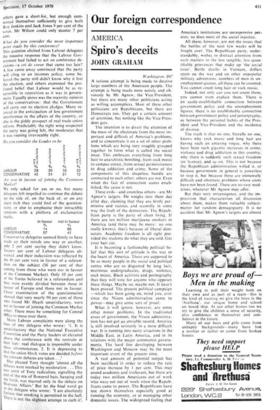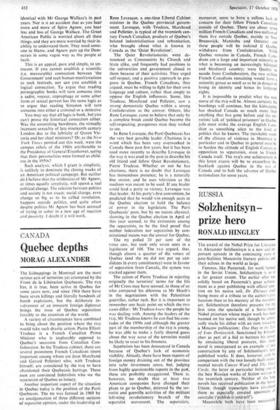Our foreign correspondence
AMERICA
Spiro's deceits
JOHN GRAHAM
Washington DC A serious attempt is being made to deceive large numbers of the American people. The attempt is being made most noisily and ob- viously by Mr Agnew, the Vice-President, but there are many other politicians acting as willing accomplices. Most of these other politicians are Republicans, but there are Democrats too. They get a certain amount of attention, but nothing like the Vice-Presi- dent gets.
The intention is-to divert the attention of the mass of the electorate from the most im- portant and difficult of America's problems, and to concentrate it on a set of other prob- lems which are being very roughly grouped together to form what is called the social issue. This embraces everything from long hair to anarchistic bombing, from rock music to campus unrest, from sexual permissiveness to drug addiction and crime. Some of the components of this shapeless bundle are connected to each other; others are not. Even when the fact of connection seems estab- lished, the cause is not.
These evils—and countless others—are Mr Agnew's targets. He weighs into them day after day, claiming that they are firstly per- missive and vicious, and secondly in some way the fault of the democrats. The Repub- lican party is the party of clean living. If there are ten million marijuana smokers in America (and there may be more: no one really knows), that's because of liberal dem- ocrats. Academic freedom is all right pro- vided the students do what they are told. Get your hair cut.
It is becoming a fashionable political be- lief that this sort of attitude is the way to the heart of America. There are supposed to be so many people in the social and political centre who are so disgusted by long hair, mutinous undergraduates, drugs, violence, rock music, Black activists and pornography that they will vote for anyone who opposes these things. Maybe so; maybe not. It hasn't been proved. The present political campaign —which has been going on, mind you, ever since the Nixon administration came to power—may give some sort of proof.
What it will ignore, however, are some other minor problems. In the traditional areas of government, the Nixon administra- tion has not got an enviable record. America is still involved seriously in a most difficult war. It is running into nasty situations in the Middle East, in Latin America, and in its relations with the major communist govern- ments. The hard line developing between Washington and Moscow may be the most important event of the present time.
A vast amount of potential output has been sacrificed in order to reduce the rate of price increase by 1 per cent. This may sound academic and irrelevant, but there are today two million Americans out of work who were not out of work when the Repub- licans came to power. The Republicans have not shown themselves especially good at running the economy, or at managing other domestic issues. The widespread feeling that America's institutions are unresponsive per, sists; so does most of the social injustice.
All these, however, are not the issues that the battles of the next few weeks will be fought over. The Republican party, under- standably, wishes to distract attention from such matters to the less tangible, less quan- tifiable grievances that make up 'the social issue'. Battle deaths in Vietnam, dollars spent on the war and on other unpopular military adventures, numbers of men in un- employment queues, all these can be counted. You cannot count long hair or rock music.
Indeed, not only can you not count them, you cannot even explain them. There is an easily-establishable connection between government policy and the unemployment figures; there is no establishable connection between government policy and pornography, or between the personal habits of the Pres- ident and Vice-President and the incidence of divorce.
The truth is that no one, literally no one, knows why rock music and long hair are having such an amazing vogue, why there have been such gigantic increases in crime, violence and drug addiction in this country, why there is suddenly such sexual freedom (or licence), and so on. This is not because the Republican administration willed it. or because government in general is powerless to stop it, but because these are immensely difficult and obstinate problems whose roots have not been found. There are no easy med- icines, whatever Mr Agnew may offer.
But their very intransigence, and the im- precision that characterises all discussion about them, makes them valuable subject. matter for random demagoguery. It is no accident that Mr Agnew's targets are almost
identical with Mr George Wallace's in past years. Nor is it an accident that as you hear more and more of Spiro Agnew, you hear less and less of George Wallace. The Great American Public is worried about all these things, and they are more worried by their in- ability to understand them. They need some- one to blame, and Agnew puts up the Dem- ocrats in some vague way as the people at fault.
This is an appeal, pure and simple, to,un- reason. If you cannot establish a scientific (i.e. measurable) connection between 'the Government' and such human manifestations as rock festivals, nor can you establish a logical connection. To argue that reading pornographic books will turn someone into a sadist, voyeur, coprophage or some other form of sexual pervert has the same logic as to argue that reading Simenon will turn someone into either a criminal or a detective.
You may say that all logic is bunk, but you can't prove the historical connection either. Was the astonishing bawdiness, the virtually incessant sexuality of late nineteenth century London due to the lubricity of Queen Vic- toria and her chief ministers? Or, as the New York Times pointed out this week, were the campus rebels of the 1960s attributable to the Presidency of General Eisenhower, seeing that their personalities were formed as child- ren in the 1950s?
Such analysis, which I grant is simplistic, is unlikely to dominate the closing weeks of an American political campaign. But neither do I believe that the stridencies of Mr Agnew, at times equally simplistic, will spawn a real political change. The relation between politics and society is not exact; social change, even change so big as to be called revolution, happens outside politics, and quite often despite politics Mr Agnew has been accused of trying to usher in a new age of reaction and passivity. I doubt if it will work.







































 Previous page
Previous page